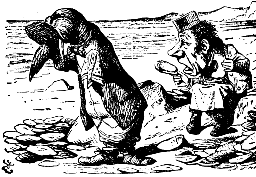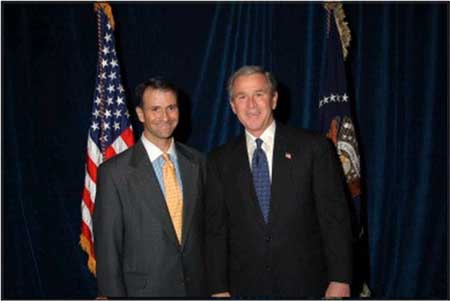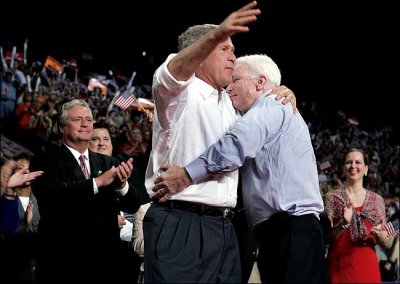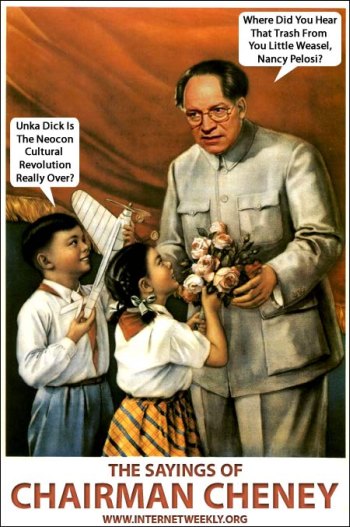by Walden Bello
Foreign Policy In FocusDecember 27, 2006
When it first became part of the English vocabulary in the early 1990s,
globalization was supposed to be the wave of the future. Fifteen years ago, the writings of globalist thinkers such as
Kenichi Ohmae and
Robert Reich celebrated the advent of the emergence of the so-called borderless world. The process by which relatively autonomous national economies become functionally integrated into one
global economy was touted as “irreversible. ” And the people who opposed globalization were disdainfully dismissed as modern day incarnations of the
Luddites that destroyed machines during the
Industrial Revolution.
Fifteen years later, despite runaway shops and
outsourcing, what passes for an international economy remains a collection of national economies. These economies are interdependent no doubt, but domestic factors still largely determine their dynamics.
Globalization, in fact, has reached its high water mark and is receding.
Bright Predictions, Dismal Outcomes
During globalization’s heyday, we were told that state policies no longer mattered and that corporations would soon dwarf states. In fact, states still do matter. The European Union, the U.S. government, and the Chinese state are stronger economic actors today than they were a decade ago. In China, for instance,
transnational corporations (TNCs) march to the tune of the state rather than the other way around.
Moreover, state policies that interfere with the
market in order to build up industrial structures or protect employment still make a difference. Indeed, over the last ten years,
interventionist government policies have spelled the difference between development and underdevelopment, prosperity and poverty. Malaysia’s imposition of capital controls during the
Asian financial crisis in 1997-98 prevented it from unraveling like Thailand or Indonesia. Strict capital controls also insulated China from the economic collapse engulfing its neighbors.
Fifteen years ago, we were told to expect the emergence of a transnational capitalist elite that would manage the world economy. Indeed, globalization became the “grand strategy” of the
Clinton administration, which envisioned the U.S. elite being the primus inter pares -- first among equals -- of a global coalition leading the way to the new, benign world order. Today, this project lies in shambles. During the reign of
George W. Bush, the nationalist faction has overwhelmed the transnational faction of the economic elite. These nationalism-inflected states are now competing sharply with one another, seeking to beggar one another’s economies.
A decade ago, the
World Trade Organization (WTO) was born, joining the
World Bank and the
International Monetary Fund (IMF) as the pillars of the system of international economic governance in the era of globalization. With a triumphalist air, officials of the three organizations meeting in Singapore during the first ministerial gathering of the WTO in December 1996 saw the remaining task of “global governance” as the achievement of “coherence,” that is, the coordination of the
neoliberal policies of the three institutions in order to ensure the smooth,
technocratic integration of the global economy.
But now
Sebastian Mallaby, the influential pro-globalization commentator of the
Washington Post, complains that “trade liberalization has stalled, aid is less coherent than it should be, and the next financial conflagration will be managed by an injured fireman.” In fact, the situation is worse than he describes. The IMF is practically defunct. Knowing how the Fund precipitated and worsened the
Asian financial crisis, more and more of the advanced developing countries are refusing to borrow from it or are paying ahead of schedule, with some declaring their intention never to borrow again. These include Thailand, Indonesia, Brazil, and Argentina. Since the Fund’s budget greatly depends on debt repayments from these big borrowers, this boycott is translating into what one expert describes as “a huge squeeze on the budget of the organization.”
The World Bank may seem to be in better health than the Fund. But having been central to the debacle of structural adjustment policies that left most developing and transitional economies that implemented them in greater poverty, with greater inequality, and in a state of stagnation, the Bank is also suffering a crisis of legitimacy.
But the crisis of multilateralism is perhaps most acute at the WTO. Last July, the
Doha Round of global negotiations for more
trade liberalization unraveled abruptly when talks among the so-called
Group of Six broke down in acrimony over the U.S. refusal to budge on its enormous subsidies for agriculture. The pro-free trade American economist
Fred Bergsten once compared trade liberalization and the WTO to a bicycle: they collapse when they are not moving forward. The collapse of an organization that one of its director generals once described as the “jewel in the crown of
multilateralism” may be nearer than it seems.
Why Globalization Stalled
Why did globalization run aground? First of all, the case for globalization was oversold. The bulk of the production and sales of most TNCs continues to take place within the country or region of origin. There are only a handful of truly global corporations whose production and sales are dispersed relatively equally across regions.
Second, rather than forge a common, cooperative response to the global crises of overproduction, stagnation, and environmental ruin, national
capitalist elites have competed with each other to shift the burden of adjustment. The Bush administration, for instance, has pushed a weak-dollar policy to promote U.S. economic recovery and growth at the expense of Europe and Japan. It has also refused to sign the
Kyoto Protocol in order to push Europe and Japan to absorb most of the costs of global environmental adjustment and thus make U.S. industry comparatively more competitive. While cooperation may be the rational strategic choice from the point of view of the global
capitalist system, national capitalist interests are mainly concerned with not losing out to their rivals in the short term.
A third factor has been the corrosive effect of the double standards brazenly displayed by the
hegemonic power, the United States. While the Clinton administration did try to move the United States toward
free trade, the Bush administration has hypocritically preached free trade while practicing
protectionism. Indeed, the trade policy of the Bush administration seems to be free trade for the rest of the world and protectionism for the United States.
Fourth, there has been too much dissonance between the promise of globalization and free trade and the actual results of neoliberal policies, which have been more poverty, inequality, and stagnation. One of the very few places where poverty diminished over the last 15 years is China. But
interventionist state policies that managed market forces, not neoliberal prescriptions, were responsible for lifting 120 million Chinese out of poverty. Moreover, the advocates of eliminating capital controls have had to face the actual collapse of the economies that took this policy to heart. The globalization of
finance proceeded much faster than the globalization of
production. But it proved to be the cutting edge not of prosperity but of chaos. The Asian financial crisis and
the collapse of the economy of Argentina, which had been among the most doctrinaire practitioners of capital account liberalization, were two decisive moments in reality’s revolt against theory.
Another factor unraveling the globalist project is its obsession with
economic growth. Indeed, unending growth is the centerpiece of globalization, the mainspring of its legitimacy. While a recent World Bank report continues to extol rapid growth as the key to expanding the global
middle class,
global warming,
peak oil, and other environmental events are making it clear to people that the rates and patterns of growth that come with globalization are a surefire prescription for ecological Armageddon.
The final factor, not to be underestimated, has been
popular resistance to globalization. The battles of Seattle in 1999, Prague in 2000, and Genoa in 2001; the massive global anti-war march on February 15, 2003, when the anti-globalization movement morphed into the global anti-war movement; the collapse of the WTO ministerial meeting in Cancun in 2003 and its near collapse in Hong Kong in 2005; the
French and
Dutch peoples’ rejection of the neoliberal, pro-globalization
European Constitution in 2005 -- these were all critical junctures in a decade-long global struggle that has rolled back the neoliberal project. But these high-profile events were merely the tip of the iceberg, the summation of thousands of anti-neoliberal, anti-globalization struggles in thousands of communities throughout the world involving millions of peasants, workers, students, indigenous people, and many sectors of the middle class.
Down but not out While corporate-driven globalization may be down, it is not out. Though discredited, many pro-globalization neoliberal policies remain in place in many economies, for lack of credible alternative policies in the eyes of technocrats. With talks dead-ended at the WTO, the big trading powers are emphasizing free trade agreements (FTAs) and
economic partnership agreements (EPAs) with developing countries. These agreements are in many ways more dangerous than the multilateral negotiations at the WTO since they often require greater concessions in terms of market access and tighter enforcement of intellectual property rights.
However, things are no longer that easy for the corporations and trading powers. Doctrinaire neoliberals are being eased out of key positions, giving way to pragmatic technocrats who often subvert neoliberal policies in practice owing to popular pressure. When it comes to FTAs,
the global south is becoming aware of the dangers and is beginning to resist. Key South American governments under pressure from their citizenries derailed the
Free Trade of the Americas (FTAA -- the grand plan of George W. Bush for the Western hemisphere -- during the Mar del Plata conference in November 2005.
Also, one of the reasons many people resisted
Prime Minister Thaksin Shinawatra in the months before the recent coup in Thailand was his rush to conclude a free trade agreement with the United States. Indeed, in January this year, some 10,000 protesters tried to storm the building in Chiang Mai, Thailand, where U.S. and Thai officials were negotiating. The government that succeeded Thaksin’s has put the U.S.-Thai FTA on hold, and movements seeking to stop FTAs elsewhere have been inspired by the success of the Thai efforts.
The retreat from neoliberal globalization is most marked in Latin America. Long exploited by foreign energy giants, Bolivia under
President Evo Morales has nationalized its energy resources.
Nestor Kirchner of Argentina gave an example of how developing country governments can face down finance capital when he forced northern bondholders to accept only 25 cents of every dollar Argentina owed them.
Hugo Chavez has launched an ambitious plan for regional integration,
the Bolivarian Alternative for the Americas (ALBA), based on genuine economic cooperation instead of free trade, with little or no participation by northern TNCs, and driven by what Chavez himself describes as a “logic beyond capitalism.”
Globalization in Perspective
From today’s vantage point, globalization appears to have been not a new, higher phase in the development of capitalism but a response to the underlying structural crisis of this system of production. Fifteen years since it was trumpeted as the wave of the future, globalization seems to have been less a “brave new phase” of the capitalist adventure than a desperate effort by global capital to escape the stagnation and disequilibria overtaking the global economy in the 1970s and 1980s. The collapse of the centralized socialist regimes in Central and Eastern Europe deflected people’s attention from this reality in the early 1990s.
Many in progressive circles still think that the task at hand is to “humanize” globalization. Globalization, however, is a spent force. Today’s multiplying economic and political conflicts resemble, if anything, the period following the end of what historians refer to as the first era of globalization, which extended from 1815 to the eruption of World War I in 1914. The urgent task is not to steer corporate-driven globalization in a “social democratic” direction but to manage its retreat so that it does not bring about the same chaos and runaway conflicts that marked its demise in that earlier era.
Walden Bello is professor of sociology at the University of the Philippines and executive director of the Bangkok-based research and advocacy institute Focus on the Global South. An extended version of this piece titled "The Capitalist Conjuncture: Overaccumulation, Financial Crises, and the Retreat from Globalization," appears in the latest issue of Third World Quarterly (Vol. 27, No. 8, 2006).
























